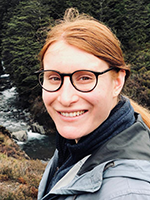About the WSPM course
Course description
The MSc course comprises:
- Seven core modules within three thematic areas which are assessed by written examination;
- Two electives which are assessed through essays and/or coursework for MSc students;
- A piece of original research which is assessed through a dissertation; and
- Training in research design and skills.
Core modules and elective modules are taught in the first two terms, leaving the third term for examinations and dissertation preparation.
| Michaelmas Term | Hilary Term | Trinity Term | Summer |
|---|---|---|---|
Exams |
|||
Water ManagementWater Science
Water & Society
|
|||
| Elective 1 | Elective 2 | ||
| Research Design and Skills | |||
| Dissertations | |||
Teaching methods and contact hours
The teaching is concentrated in the first two terms. The course is taught through a combination of lectures for core modules, small group teaching for elective courses (maximum class size 10), practical sessions, field trips and study days. In each week, there are approximately 12-14 hours of formal contact time. For core modules, there are normally 8-10 hours of lectures per week, delivered through two-hour lecture sessions. Electives are normally delivered in 4-6 sessions across the term, each lasting 90 minutes to 2 hours. Individual extended reading is an important part of the course programme and up to 3 hours of reading may be set in preparation for each two-hour class. In weeks with field trips or study days, the number of contact hours will be greater.

"Once, when I described my training in water science, policy and management, a colleague said 'that seems awfully specific'. Then we had a conversation that linked topics from climate modeling, to new policies on water allocation, to developing catchment management strategies that would support the rights and aspirations of indigenous peoples. At the end of our conversation, she said 'I take it back - you studied the whole world'."
Sarah Boone, WSPM course alumna
Thematic areas and core modules
Water Science: comprising Climate & Catchment Processes; Water & Health; Water Risks & Response
This thematic area develops knowledge and understanding in physical, chemical, ecological and epidemiological aspects of water science in temperate, tropical and semi-arid zones. It provides a foundation in basic processes in each key subject area, as well as interactions throughout the hydrological cycle, the role of society in altering 'natural' hydrological processes and function, and the impact this has on health and environment.
Water and Society: comprising Economics, Law & Governance of Water; Water Policy; Water-Society Interactions & Sustainable Development
This thematic area explores how contested domains of power, interests and knowledge influence water decision-making, illustrated through institutional, socio-economic and policy analysis. This covers areas of water security, governance, and regulation, climate change adaptation, transboundary water, water access, ownership and rights, water for development, gender, intersectionality, and interactions between the state and civil society within dynamic and varied political, cultural, social and economic contexts.
Water Management
This thematic area helps students to integrate the knowledge and understanding of water developed in the other thematic areas to better enable them to tackle the big water management challenges that we face. Geographic water security case studies are developed throughout the module to compare the trade-offs that occur between science and society in these contexts. Interactions with experts with different perspectives and expertise will help students to understand the challenges faced by water managers. This module includes a number of field trips to examine and evaluate real water management issues.
Dissertation
An independent and original dissertation is an integral component of the course. It is expected that the best dissertations will be of publication quality, and all should show originality in and/or competent and creative scholarship. In order to equip students with the necessary skills to undertake high quality, original and independent research, a suite of training activities are taught across three terms to develop key transferable skills and expose students to applied methods used widely in academic and professional research.
Research design and skills
As well as equipping students with the necessary frameworks to develop their research projects, faculty staff lead a series of training sessions to build core transferable skills in the natural and social sciences. Components include: research ethics, academic writing, research design, modelling, GIS, water quality evaluation, and qualitative and quantitative research methods. The skills training will focus on strengthening capabilities to conduct high quality research as well as for future professional development.
Elective modules
Elective Modules offer a tutorial-style teaching and discussion environment within smaller groups, based on a suite of contemporary research themes that reflect the specific interests of core faculty and visiting research associates. They involve eight hours of instruction that may be organised in different formats. Each student has the opportunity to identify elective modules of particular interest, though there is a selection process for these electives through committee at the start of term. As such, the teaching aim is to foster discussion and debate between academic staff and students to identify and explore theory, methods and practice in an academic space that encourages a critical dialogue.
Fuller details of our current range of electives are available from the Course Co-ordinator. The portfolio of electives on offer may change from year to year.
Residential field trips
Fieldwork and field visits are a significant element of the programme's teaching philosophy. Each year there are a number of compulsory residential and one-day field trips that allow students to implement and gain practical experience in different areas of water management based on taught concepts, frameworks and techniques. Our students spend at least two weeks a year in the field as part of the Water Management module, supplementing theoretical classroom studies back in Oxford.
Field trips commonly include:
- Residential study tour of water management in the Ebro river from source to delta in northern Spain;
- Residential geo-hydrological exploration of the Jurassic coastline of Dorset, UK, and site visits to Wessex Water groundwater pumping station;
- Guided tour of the Jubilee River extension to mitigate flood risks in the lower Thames Basin;
- One-day field visit of Otmoor wetlands, Oxfordshire, to explore aquatic ecosystem function and undertake macroinvertebrate sampling;
- Visit to a drinking-water treatment works and waste water treatment plant.
Core Staff
This inter-disciplinary course is led by academics in the School of Geography and the Environment, supported by experienced practitioners, all of whom have considerable national and international expertise.
- Professor Rob Hope: Professor of Water Policy
- Dr Jocelyne Hughes: Researcher
- Dr Linda Speight: Departmental Lecturer in Physical Geography
- Dr Sonia Hoque: Postdoctoral Researcher
- Dr Alex Money: Director, Innovative Infrastructure Investment Programme, SSEE
- Professor Simon Dadson: Professor of Hydrology
- Professor Jim Hall: Professor of Climate and Environmental Risks
- Dr Homero Paltan: Research Associate
- Dr Catherine Grasham: Postdoctoral Researcher in Water Security and Society
- Dr Saskia Nowicki: Postdoctoral Researcher in Drinking-Water Safety
- Dr Anna Murgatroyd: Postdoctoral Research Associate in Water Security
- Dr Johanna Koehler: Honorary Research Associate, Smith School of Enterprise and the Environment
- Dr Christine McCulloch: Visiting Research Associate
- Dr Helen Gavin: Researcher
- Ben Piper: WSPM Teaching Associate
- Dr Pauline Smedley: Hydrogeochemist, British Geological Survey
- Dr Abi Stone: Lecturer in Physical Geography, University of Manchester
- Dr David Thomas: Process Engineer, Mott MacDonald Group
- Professor Paul Whitehead: Visiting Professor of Water Science
- Dr David Johnstone: Distinguished Research Associate
- Michael Rouse CBE: Distinguished Research Associate
- Professor Edmund Penning-Rowsell OBE: Distinguished Research Associate
- Professor David Bradley: Distinguished Visiting Scholar

"Despite good intentions, when faced with a complex issue, decision makers often propose solutions based on what they already know. Water security, in all of its complexity, depends on multidisciplinary innovators who can translate across silos, and support decision making to think beyond what is comfortable."
Sarah Rountree Schlessinger, WSPM course alumna
Please note: The actual course content may vary from the information provided online and should therefore be taken to be indicative rather than tightly prescriptive.







